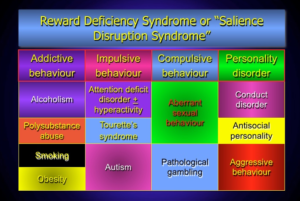Reward deficiency syndrome and brain disease

Reward deficiency syndrome and brain disease. In fact, it is the reward deficiency syndrome that causes the compulsive use of alcohol and drugs that help to feel good, at least temporarily
Reward deficiency syndrome and brain disease: Rebuilding Neurotransmitter
A host of medical and lifestyle issues can disturb the healthy flow of neurotransmitters, including chronic stress, alcohol, drug abuse, genetics, poor diet, digestive disturbances and mal-absorption, micronutrient deficiency and more. The result can be Reward Deficiency Syndrome (RDS), a term primarily used for hereditary chemical imbalances wherein the pleasure centers, which regulate feelings of well-being in the brain, fail to receive appropriate neural signals. As a result, the brain sends out urgent messages of craving. Doctor Dalal Akoury MD, President, and founder of the AWAREmed health and wellness resource center reiterates that, in the brains of addicts, various neurotransmissions are affected, depending upon the drug or drugs that have been used. As a result addicts experience difficulty concentrating and have mood swings, as well as having other physical symptoms.
Collectively, these symptoms are called cravings and withdrawals. Craving and withdrawal symptoms are a result of a neurochemical imbalance in the brain. If these imbalances are not addressed, life can be miserable to drug users and that is why doctor Akoury created this health facility with a primary objective of transforming each individual’s life through increasing awareness about health and wellness and by empowering individuals to find their own inner healing power. Besides that it will also interest you to note that, doctor Akoury’s practice focus on personalized medicine through healthy lifestyle choices that deal with primary prevention and underlying causes instead of patching up symptoms. This should motivate you to schedule an appointment with her now by calling her on telephone number 843 213 1480 for the commencement of your recovery process. And as you consider that, let’s look at some of the reward deficiency syndromes;
- Neurotransmitters are chemicals in the brain that help to control states of consciousness, including moods.
- Serotonin and GABA down-regulate electrical activity in the brain, thereby contributing to calm, peacefulness, or less anxiety.
- Adrenaline and noradrenaline up-regulate electrical activity thereby promoting excitement, motivation, or, reducing depression and apathy.
- Dopamine is the “feel good” brain chemical. It is the dance of these electro-chemicals that produce emotional balance and feelings of well-being.
Reward deficiency syndrome and brain disease: When the neurochemicals are impaired
When the proper flow, or cascade, of these neurochemicals is impaired, or, the brain’s receptors are blocked, then a variety of problems can develop, including:
- Mood instability
- Irritability
- Agitation
- Hypersensitivity
- Anxiety
- Depression
- Apathy
- Impaired concentration
- Trouble focusing
- Despair
Finally, it is the Reward Deficiency Syndrome that causes the compulsive use of alcohol and drugs that help to feel good, at least temporarily. In addition to alcohol, people use nicotine, other stimulants, illicit drugs, junk foods, sugars, or thrill-seeking behaviors such as gambling, sex, and Internet porn. Unfortunately, this only provides temporary relief while bringing with it the possibility of more long-term problems. For lasting solution to addiction, only experts on the same line will liberate you from this problem. Doctor Dalal Akoury is an expert you can rely on for whatever addiction you are going through.
Reward deficiency syndrome and brain disease: Rebuilding Neurotransmitter
http://www.integrativeaddictionconference.com/wp-admin



